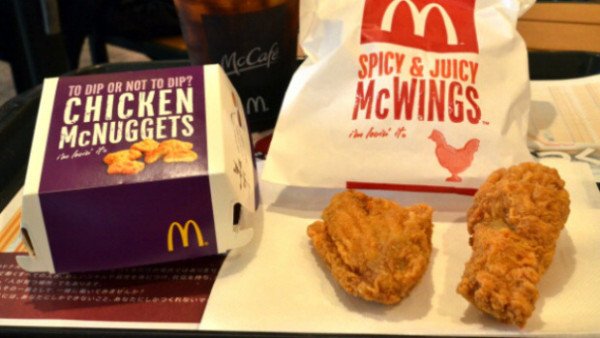McDonald’s has announced it will stop US purchases of chicken injected with antibiotics important to human medicine.
Chicken served in McDonald’s 14,000 US restaurants will be free of such antibiotics within two years, the company said.
The move comes amid concerns that the overuse of antibiotics in chicken may affect the drugs’ effectiveness in fighting diseases in people.
McDonald’s, the world’s biggest restaurant chain, has been battling to win back customers amid slowing sales.
Many poultry producers give their birds antibiotics to make them grow faster. But overuse of the drugs could lead to them becoming less effective in treating illness and disease in humans.
McDonald’s worldwide like-for-like sales – which strip out the effect of new restaurants opening – fell by a more-than-expected 1.8% in January on the back of a supplier scandal in China.
Its image was also tarnished after a human tooth was found in a portion of fries in Japan last year. The company issued an apology in January.
In a statement, Marion Gross, senior vice-president of North America supply chain, said that McDonald’s “believes that any animals that become ill deserve appropriate veterinary care and our suppliers will continue to treat poultry with prescribed antibiotics”.
After treatment, the bird “will no longer be included in our food supply”.
However, McDonald’s chicken will be given ionophores, an antibiotic which helps keep chickens healthy but is not used for humans.
The company also said that dairy products, such as low fat white milk and fat-free chocolate milk, would be derived from cows that have not been treated with rbST – an artificial growth hormone.
“While no significant difference has been shown between milk derived from rbST-treated and non-rbST-treated cows, we understand this is something that is important to our customers,” Marion Gross said.
The changes come in response to growing US consumer demand for food made with natural ingredients only.
[youtube Mwi3Q8qfakU 650]
According to US researchers, young children who are given repeated courses of antibiotics are at greater risk than those who use fewer drugs of becoming obese.
The JAMA Pediatrics report found children who had had four or more courses by the age of two were at a 10% higher risk of being obese.
However, scientists warn this does not show antibiotics cause obesity directly and recommend children continue using them.
Many more studies are needed to explain the reasons behind the link, they say.
Researchers from the University of Pennsylvania and Bloomberg School of Public Health reviewed the health records of more than 64,500 American children between 2001 and 2013.
The children were followed up until they reached five years of age.

Young children who are given repeated courses of antibiotics are at greater risk than those who use fewer drugs of becoming obese
Almost 70% of them had been prescribed two courses of antibiotics by the time they were 24 months old.
But those who had four or more courses in this time were at a 10% higher risk of being obese at the age of five than children who had been given fewer drugs.
And the type of antibiotics they were prescribed appeared to make a difference too – those given drugs targeted at a particular bug were less likely to put on weight.
But those given a broad-spectrum antibiotic – that can kill several types of bacteria indiscriminately – were more likely to have a higher body mass.
Prof. Charles Bailey at the University of Pennsylvania, said: “We think after antibiotics some of the normal bacteria in our gut that are more efficient at nudging our weight in the right direction may be killed off and bacteria that nudge the metabolism in the wrong direction may be more active.”
And researchers say the study highlights that over prescribing inappropriate antibiotics could have a negative impact on child growth.
Meanwhile in a separate study, scientists reporting in the journal of the American Society for Microbiology found that a species of gut bacteria – called Clostridium ramosum – could promote weight gain in mice.
Mice with these bacteria present in their guts became obese when fed a high-fat diet, while those that did not have the bacteria put on less weight despite being given high-calorie meals.
The scientists, from the German Institute of Human Nutrition, in Nuthetal, are now trying to understand how the bacteria interact with digestion.


